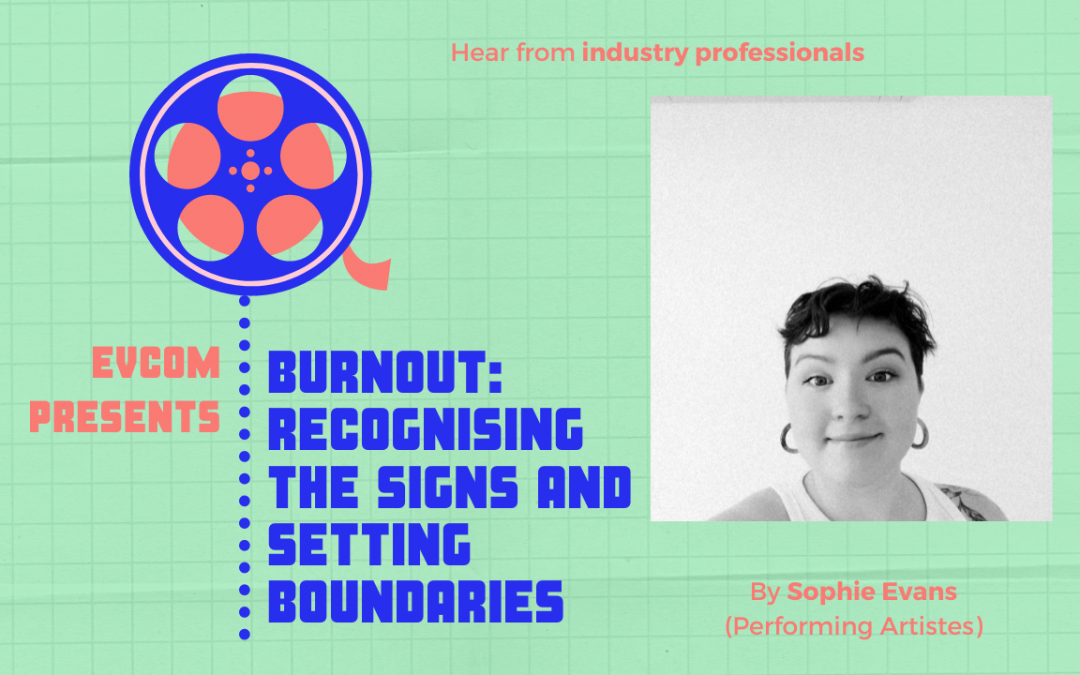Did you know that the average person will spend 90,000 hrs of their lifetime working? My name is Sophie and I am championing the awareness of burnout for everyone, specifically for young people. Why? I experienced early symptoms myself which proved to have a harmful effect on my health. Since then I have found a workplace which supports my wellbeing and enables me to be a Shadow Board member at EVCOM where I can give valuable feedback on such experiences, in particular to employers to keep their young workers healthier.
A dictionary definition of ‘burnout’:
‘burnout’
phrasal verb of burn
- ruin one’s health or become completely exhausted through overwork e.g “doing one task for too long can cause you to burnout”
Truly an occupational phenomenon, ‘burnout’ it is not yet clinically diagnosed but sufferers will experience symptoms recognised as contributing to a health issue, such as Depression. Below are some physical, emotional and mental symptoms some people experience, and coping strategies they may use.
Symptoms:
- Feelings of dread or doom when thinking about work
- Very low energy or excessive fatigue
- Using alcohol, prescribed/non-prescribed drugs, overuse of social media, or food to ‘get away’
- Feeling annoyed, irritable or snappy with other people
- Lack of sleep or oversleeping
- No interest in otherwise enjoyable out of work activities
Defining and recognising burn out:
If you’ve looked at these and have recognised some of them, you might already be suffering from burnout. The word conjures an image of perhaps a blazing fire burning right down to a small, grey pile of ash which is what it felt like for me.
By translating this into work culture, we often start a job with the intention of doing our best in our new ventures so we are keen to impress our new company ‘family’ by jumping in headfirst into said flame. Some of us can burn bright for a long time, years even. Others find the burnout process to be a quick but debilitating one. Both of these experiences are valid no matter the level of responsibility your job is given. Young people in high pressure jobs may feel like Superman at the beginning but without prior workplace experience, signs can go overlooked.
How to combat it:
Fighting burnout need not happen as preventing it should start soon as you begin your new job or venture. To do so use tools to enable you to be well equipped and protected:
- What kind of employer are they? When applying for a new role find out whether they have a Mental Health First Aider or if you would get a Mentor to help you settle in. If not think about suggesting you sign up to be trained in mental health to help yourself and co-workers.
- What sort of learner are you? Whether you’re a Visual, Auditory or Kinaesthetic learner tell your employer how best you learn. Find out which by taking a simple multiple-choice questionnaire online.
- Know your boundaries, and don’t always be the ‘yes’ man. Aren’t ready to hand in that proposal yet? Are emails coming in by the ton and is panic mode setting in? Tell your manager: honesty is key to being assertive and setting boundaries.
- Make mistakes – yes really! How did everyone else get there? It is of course by trial and error. Remember getting it wrong is not the end of everything, it is how we learn!
- Seek help: many of us will be faced with challenges in new jobs. Sometimes we might not get trained up enough or need a little extra time to ‘get it’. A good employer will not hold this against you.
- Lay off the booze! It can feel comforting to have a well-earned tipple at the end of a hellish day, but it is worth noting that alcohol is a depressant when you’re low, this can bring you even closer to your burnout point, and faster!
- Give it 100% but no higher. Priding yourself on your commitment to your work is admirable, but letting it seep into your out-of-work hours is not. Take that rest and take all of it!
- Band together with peers – if you are suffering from burnout, they’re likely to be feeling somewhat similar. Asking and offering mutual support as well as identifying common problems can benefit the whole workforce.
My conclusion?
Work shouldn’t make you miserable. Ultimately job happiness is created and driven by a positive and supportive work environment, plus you owning your strengths and areas for improvement to perform your best.
So make those 90,000 work hours worth your time!
Further help/ references:
Learning styles
NHS website
Mental health – NHS (www.nhs.uk)
Mind
Samaritans 24 hour support line/website
116 123 / Samaritans | Every life lost to suicide is a tragedy | Here to listen
PAPYRUS
Papyrus UK Suicide Prevention | Prevention of Young Suicide (papyrus-uk.org)
Mental Health First Aider training
Mental health training online and face to face · MHFA England
By Sophie Evans (Performing Artistes)



